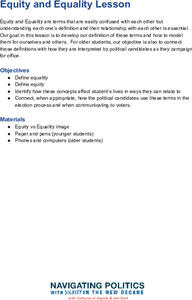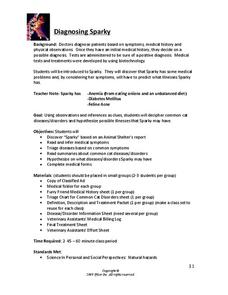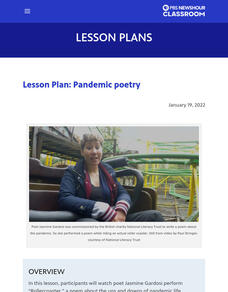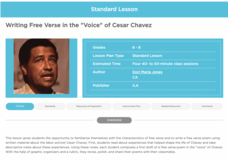National Institute of Drug Abuse
Nurturing My Mental and Emotional Health
One exercise does not necessarily work for all! A resource from the National Institutes of Health provides tweens and teens with exercises to help them cope with anxiety and stress. Participants note their stress levels before and after...
Newseum
You Can’t Say That: Right to Know vs. Security Risk
Print or block? That is the question young journalists debate as part of their study of the freedom of the press. Half the class represents the journalists' legal team, and the other half represents the government's legal team. Teams...
Scholastic
Stressed Out?
Provide tweens and teens with information they need to know about stress with an article that details how stress affects various organs in the body. The article also offers tips for healthy ways to cope with stress.
Cultures of Dignity
Equity and Equality Lesson
Equality does not equal equity and this instructional activity explains why. Class members compare two images--one labeled "Equality" and the other "Equity." Using the provided discussion questions, they then develop definitions that...
Beyond Benign
Lucky Brand Genes: Genetic Traits
Explore single-gene traits in humans. After viewing a video introducing genetic vocabulary, individuals identify their phenotype and possible genotypes of specific traits. They consider both dominant and recessive traits. This is the...
Beyond Benign
Diagnosing Sparky
Be a vet for a day! Scholars test their veterinarian skills by assessing symptoms and making a diagnosis. They then evaluate biotechnology tests to verify the diagnosis.
Beyond Benign
Urine Jeopardy
Urine can tell us a lot about what is happening in our bodies. In a hands-on activity, scholars administer pH, glucose, ketone, and protein tests to a sample of "urine" solution made from household ingredients. Their results lead them to...
Amani Project
Write a CoronaKindness Song
And the beat goes on! Finding a way to connect during the isolation imposed by the Coronavirus pandemic can be challenging. This activity from the Amani Project offers a way to stay close during a time of physical distancing....
Amani Project
Harmony Break! Finding Emotions With Music
Gather the entire family (or class members) for a fun Harmony Break! A volunteer thinks of a color from their Mood Meter that they will express by singing, playing an instrument, or performing a dance. After the performance, the audience...
Amani Project
Harmony Break! Mood Shifting
The fifth activity in the Amani Project series, another Harmony Break, has participants demonstrate a mood shift. They begin by drumming in a way that indicates their current feelings. They then model a change in mood by transitioning...
Amani Project
Teach the Mood Meter
The third activity from the Amani Project has youths create a Mood Meter. The colorful meter, divided into red, yellow, blue, and green squares, lets participants indicate not only how they are feeling but also permits them to indicate...
Amani Project
The 5 Elements of Music
A series of activities teach young musicians that they don't need a room full of instruments to make music. The second activity in the Amani Project has participants use their hands, feet, and voices to demonstrate the five elements of...
Amani Project
Make an Instrument
Create a little harmony with Amani Project! Young musicians create their instruments using found or recycled objects. As an introduction, class members first experiment with sounds they can make with their bodies (clapping, stomping...
ReadWriteThink
Robert Frost Prompts the Poet in You
A great poem begins with an idea, an image, or an event that evokes a feeling. Middle schoolers read biographical information about Robert Frost and then identify details in three of his poems that reflect his life. Using suggestions...
ReadWriteThink
What is Poetry? Contrasting Poetry and Prose
Introduce middle schoolers to the different strategies used when reading prose versus poetry. Groups use a Venn diagram and a poetry analysis handout to compare the characteristics of an informational text and a poem on the same subject...
ReadWriteThink
Writing Free Verse in the "Voice" of Cesar Chavez
Introduce middle schoolers to free verse poetry with a lesson that has young poets read two free verse poems and list the common characteristics of the form. They then read a passage from Cesar Chavez's biography and a free verse poem...
ReadWriteThink
Persuasive Essay: Environmental Issues
Young environmentalists learn how to craft a persuasive essay about an environmental issue they consider important. After studying the components of a persuasive essay and examining a student model, writers brainstorm possible topics and...
Facing History and Ourselves
Many Voices, One National Identity
To conclude the unit on "Exploring Identity in the United States," pupils consider whether it is possible to combine many voices into one national identity. After creating an identity chart that lists words, phrases, and images that they...
Facing History and Ourselves
Connecting to the Past
Young historians research the connections between their personal histories and the histories of our country to gain a deeper understanding of who they are. To begin, class members write about an object that they consider significant to...
Facing History and Ourselves
Identity and Choices
Timshel! Thou mayest! is the big idea in a lesson that reminds learners that they have choices about how they present themselves to others. To begin, individuals rate the degree to which the choices they make each morning are influenced...
Facing History and Ourselves
Identity and Labels
Scholars look at the connections between identity and labels, assumptions, and stereotypes, in a lesson that examines identity in the United States. To set the stage for a discussion of these connections, class members analyze a cartoon,...
Facing History and Ourselves
Identity and Names
Would a rose smell as sweet, as Juliet Capulet asserts, if called by any other name? The importance of names and the connection between names and identity are examined in a lesson that explores identity in the United States. After...
Purdue University
Exploring Whirligigs
What's that silly thing spinning in the wind? It's a whirligig! Explore wonderful windy whirligigs with a STEM-based unit that teaches the science and concepts behind these gigs. Scholars discover how gravity and air resistance...

























